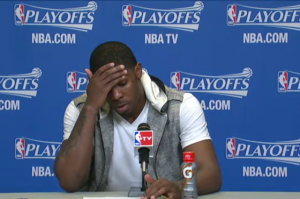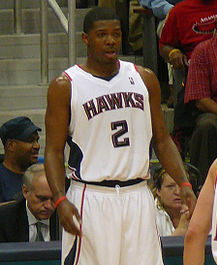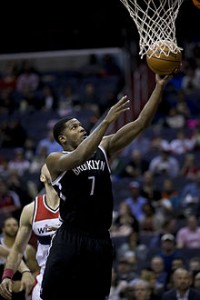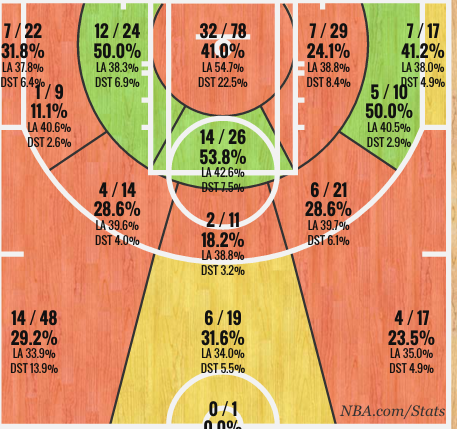 When asked recently about the trade value of Brooklyn Nets guard Joe Johnson, one Western Conference scout summed it up in six brutally painful words: “He makes a lot of money.”
When asked recently about the trade value of Brooklyn Nets guard Joe Johnson, one Western Conference scout summed it up in six brutally painful words: “He makes a lot of money.”
 After 15 NBA seasons and seven All-Star appearances, the 34-year-old Johnson has turned from a very good basketball player into just another contract a team can’t wait to get off its books. Mercifully for Brooklyn, Johnson’s contract expires at the end of this season. When it’s all said and done in Brooklyn— unless he gets traded or bought out this season, the latter of which which seems more likely— Johnson will have made just under $89.3 million over four seasons, one All-Star appearance and one playoff series victory, assuming the 9-22 Nets fail to turn this season around.
After 15 NBA seasons and seven All-Star appearances, the 34-year-old Johnson has turned from a very good basketball player into just another contract a team can’t wait to get off its books. Mercifully for Brooklyn, Johnson’s contract expires at the end of this season. When it’s all said and done in Brooklyn— unless he gets traded or bought out this season, the latter of which which seems more likely— Johnson will have made just under $89.3 million over four seasons, one All-Star appearance and one playoff series victory, assuming the 9-22 Nets fail to turn this season around.
Johnson’s sudden and rapid decline this season has surprised fans and pundits alike, leading to some ugly numbers through 31 games.
| Joe Johnson | Min | FG % | 3 FG % | Pts | Reb | Ast | PER | EFG % | TS % | O Rtg | D Rtg | WS | WS/48 |
| 2012-2013 | 36.7 | 42.3 | 37.5 | 16.3 | 3 | 3.5 | 14.1 | 49.3 | 52.1 | 109 | 111 | 5.1 | 0.092 |
| 2013-2014 | 32.6 | 45.4 | 40.1 | 15.8 | 3.4 | 2.7 | 15.5 | 53.3 | 56.4 | 110 | 112 | 4.9 | 0.091 |
| 2014-2015 | 34.9 | 43.5 | 35.9 | 14.4 | 4.8 | 3.7 | 14.1 | 49.4 | 52.3 | 105 | 110 | 4.1 | 0.07 |
| 2015-2016 | 34.6 | 35 | 30.6 | 10.6 | 4.1 | 4 | 8.6 | 40.5 | 44.1 | 92 | 111 | -0.2 | -0.008 |
While attempting just 1.6 fewer field goals per game, Johnson’s field goal percentage has decreased 8.5 percentage points since last season. His PER has completely cratered and according to win shares, which calculates the number of wins a player has contributed to his team over the course of a given season or a per-48 minute span, Johnson has been a negative player this season, a liability on the floor.
Joe Johnson used to have a sweet stroke from mid-range and the ability to knock down threes. Now look what his shot chart has become:
The red areas signify where Johnson is shooting at a percentage below the league average, which accounts for 72 percent of his field goal attempts. That’s staggering. The green areas where he shoots above the league average only make up 17.3 percent of his attempts. Perhaps a correction on where Johnson attempts his shots is in order.
 This depressingly poor play is a far cry for Johnson from the summer of 2010, when the Atlanta Hawks re-signed the 6-7 wing to a six-year max contract worth just over $123 million. He was an All-Star the following two seasons with Atlanta, helping the Hawks get one playoff series victory in the process.
This depressingly poor play is a far cry for Johnson from the summer of 2010, when the Atlanta Hawks re-signed the 6-7 wing to a six-year max contract worth just over $123 million. He was an All-Star the following two seasons with Atlanta, helping the Hawks get one playoff series victory in the process.
Danny Ferry took over as Atlanta’s president of basketball operations on June 25, 2012, and it was clear what his first objective was as GM: trade Joe Johnson.
Meanwhile, the Nets were busy trying to assemble a team of stars in preparation for a move from New Jersey to Brooklyn that September. General Manager Billy King had already traded for point guard Deron Williams from Utah in February 2011 and acquired forward Gerald Wallace from Portland in March 2012 to insert in the starting lineup alongside budding star center Brook Lopez.
So on July 11, 2012, Ferry dealt Johnson in a salary dump to the Nets for five players and a first-round pick, which was used, ironically, on current Brooklyn point guard Shane Larkin. Brooklyn won 49 games in Johnson’s first season, but lost a heartbreaking first round series to Chicago in seven games. King’s plan was apparently working, so he decided to up the ante in the summer of 2013 by trading a wheelbarrow full of future draft picks for Kevin Garnett and Paul Pierce.
As we all know now, things did not work out as planned from there. Pierce left for Washington after one season and Johnson’s lone playoff series victory with the team. Garnett was traded midway through his second season to Minnesota for current Nets forward Thaddeus Young, and the Nets are now mired in salary cap and draft pick purgatory.
The Nets brought Johnson in to be a pure scoring threat, but in 262 regular season games, Johnson scored at least 30 points just eight times. In Brooklyn’s 25 playoff games while Johnson has been on a team, he reached the 30-point mark just twice. Here’s the rest of his regular season points distribution during his time with the Nets:
| Joe Johnson Points | 0 and 9 | 10 and 19 | 20 to 29 | 30+ |
| 2015-2016 | 15 | 14 | 2 | 0 |
| 2014-2015 | 21 | 40 | 18 | 1 |
| 2013-2014 | 17 | 42 | 15 | 5 |
| 2012-2013 | 7 | 47 | 16 | 2 |
| Distribution % | 22.9 | 54.6 | 19.5 | 3.1 |
 Johnson has already logged single-digit scoring lines in 15 games this season and is on pace to have 39 such stinkers this season, up from 21 last year. After scoring at least 20 points in 19 games last season, Johnson’s on pace to score between 20 and 29 points just three or four more times for the rest of the 2015-2016 campaign, assuming they keep him for that long.
Johnson has already logged single-digit scoring lines in 15 games this season and is on pace to have 39 such stinkers this season, up from 21 last year. After scoring at least 20 points in 19 games last season, Johnson’s on pace to score between 20 and 29 points just three or four more times for the rest of the 2015-2016 campaign, assuming they keep him for that long.
But the way the Nets’ season is going, there’s no reason for the team to keep Johnson beyond the month of March. Brooklyn is 9-22 and in the league’s bottom third offensively and defensively. The Nets’ first-round pick, as you must know by now, is going to Boston as part of the ill-fated Pierce and Garnett trade, and promising first rounder Rondae Hollis-Jefferson is out until at least March as he recovers from surgery to repair a fractured right ankle.
Did the Nets make a mistake acquiring Johnson in the first place? That’s tough to say, given that what the team gave up wasn’t as much as the price Brooklyn paid for Williams, Pierce, Garnett and even Wallace. But the end has been especially painful for both player and team, as the shell of a former All-Star declines before our very eyes.
Shlomo Sprung is a national columnist for SheridanHoops who focuses on analytics, profiles and features. He is also the web editor of the Brooklyn Daily Eagle. A 2011 graduate of Columbia University’s Journalism School, he has previously worked for the New York Knicks, The Sporting News, Business Insider and other publications. You should follow him on Twitter.

I see no point in buying out Joe’s 25 million contract unless he becomes a problem in the locker room. Such a buyout might only save Proky a few million. He would likely be replaced with a minimum salary player. However, with RHJ and Chris McCullough returning, it wouldn’t make the Nets any better. More important for Proky than saving a little money, is for the Nets to remain under the Tax.
Hollins eventually will have to see how Joe performs with limited but key 4th quarter minutes. If he can’t perform well in that situation, then no team will want to waste a roster spot on him, anyway.
The Nets real goal right now is to finish the season play adequately to attract a couple of very good free agents, as well as not to be embarrassed by giving the Celtics a top 5 draft pick.
If not for the RHJ injury and a stubborn Hollins playing Joe too much (he still refuses to play Thad some minutes at SF), the Nets could easily have 6 or more extra wins. With good health, limited JJ play, once RHJ returns after the AS break, Nets could easily play 0.500 the rest of the way and meet their goals.